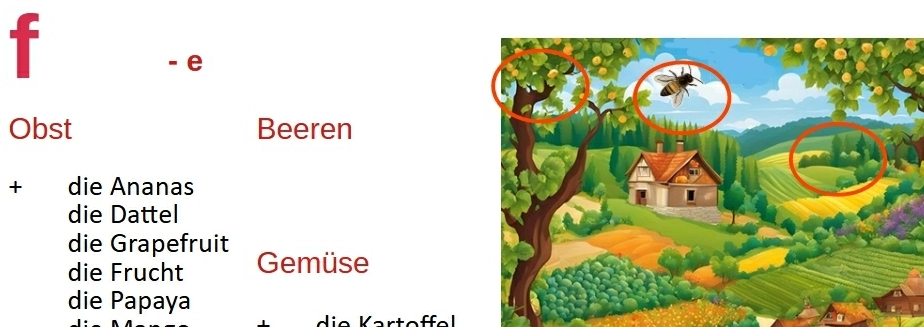Last Updated on October 3, 2024
Usually, German learners are advised to memorize words along with articles. This is all great, but it doesn’t help people with a not very good memory, especially if you didn’t learn the language at school but in courses and had to learn it in a year to B1. The result is usually complete chaos in the vocabulary. Let’s try to put it in a more structured form. There are quite a few groups of words that you can divide into one gender or another based on their meaning or ending. In the first part, we will look at the simplest feminine gender.
Plural, declension, and gender in German. Masculine gender
Plural, declension, and gender in German. Neuter gender
Tests for Gender and Plural in German
Sentences with zu in German
Verbs with prepositions in German. Preposition um and preposition über
Modal verbs in German
Past tense in German. Perfect and preterite
Separable verbs in German
SS or ß in German
From horror to anxiety: fürchten, Angst haben, erschrecken, bangen, entsetzen
Reach an agreement: vereinbaren vs verabreden, ausmachen etc.
Fahrstuhl or Aufzug or Lift and others
Feminine gender in German
Word groups by meaning
Berries, fruits, vegetables
Berries, fruits and vegetables are often feminine, but only as long as they end in -e. Almost all other endings, with rare exceptions, indicate the masculine gender.
There are very few exceptions for berries and fruits, and more for vegetables.

Trees, shrubs, flowers
There is also a noticeable neuter gender in flowers, as there are many diminutive suffixes -röschen, -sternchen.
The same pattern applies here: it ends in -e, which means it is feminine. The most outrageous exceptions are der Klee, die Zeder and die Kiefer.
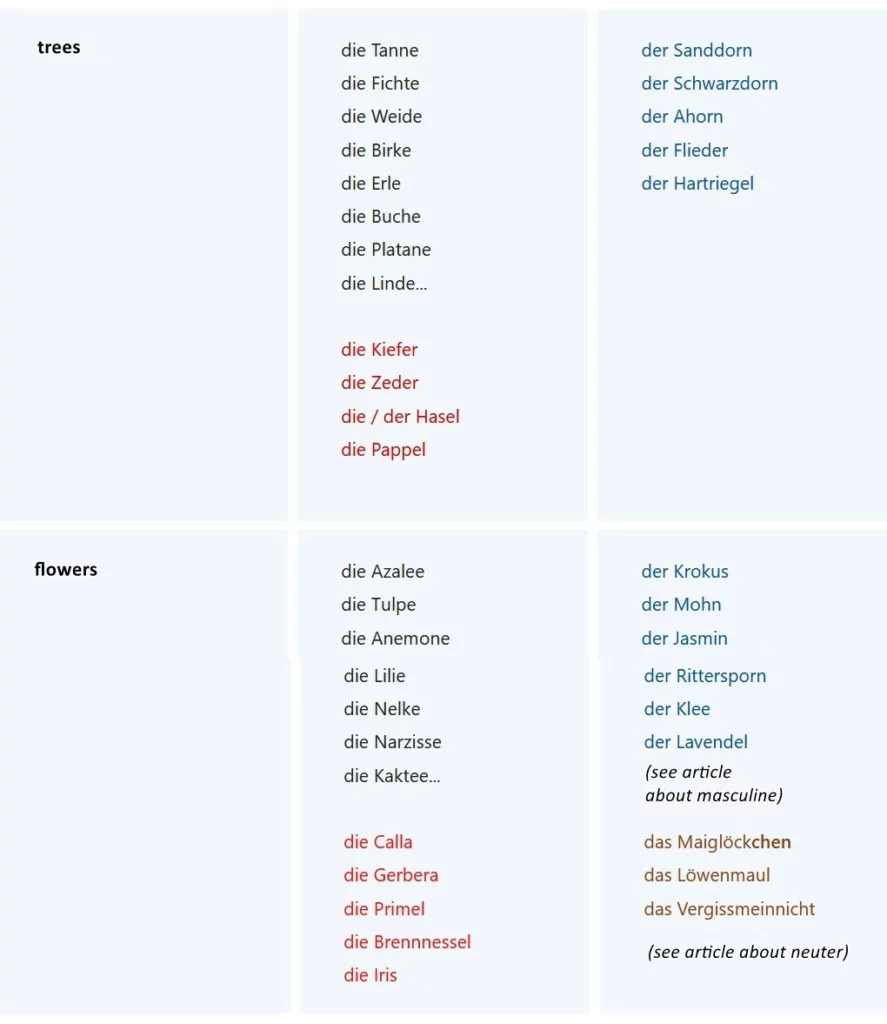
Insects+
The same story applies to insects and similar creatures: feminine ending in -e and predominantly masculine endings with other endings.

Numbers – Nouns
Substantivized numbers are relatively rarely used, but they are all feminine.
eine Eins bekomen
die Elf besiegte gestern Serbien mit 0:1
If you do not see the image, please enable advertising and cookies.
Feminine gender by form
If you do not see the image, please enable advertising and cookies.
Gender designations
Here everything is clear without exception: all words that refer to women with the suffix -in will be feminine.
Bäckerin, Sekretärin, Ärztin, Freundin…
Words ending in:
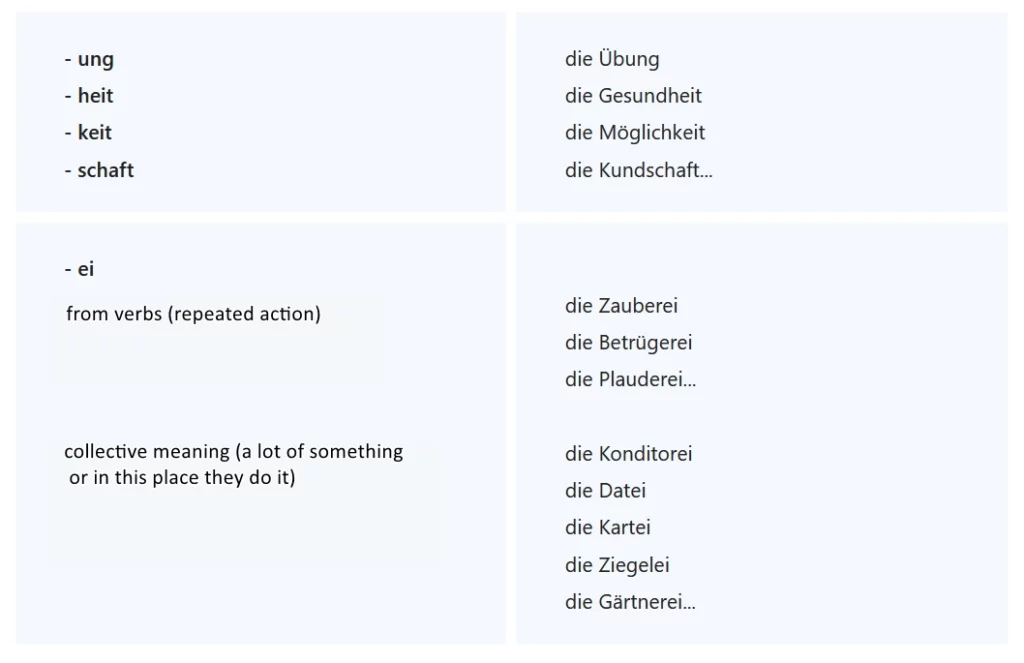
All of these words are feminine without exception, which is very practical. However, the meaning must also be the same (compare der Brei, der Schrei).
Words ending in -e
Derivatives of verbs ending in -e
There are many of these nouns.
das Ende – exception, here the noun was not formed from the verb, but the other way around.
die Wäsche
die Umfrage
die Lüge
die Bremse
die Anklage
die Rede…
Derivatives of adjectives ending in -e
die Breite
die Dicke
die Tiefe
die Höhe…
As we found out in the previous section, other groups of feminine nouns can also end in -e. In fact, most words that end in -e are feminine, but don’t forget the exceptions.
The main exceptions are:
- n-Deklination (see article about masculine),
- on Ge- (see article about neuter)
- a few words that end with -ee (der Klee, der Tee, der Kaffee, der Schnee, das Püree, das Dragee, das Frottee, das Resümee)
- the rest are single words, for example der Käse
The group with -ie (where the -ie at the end is pronounced as -i) will be discussed further.
The nouns derived from verbs with -t at the end
die Naht
die Fahrt
die Einfahrt
die Tat
die Glut
as well as those that are not recognizable at first glance
die Flucht
die Pflicht (pflegen)
die Macht (mögen)
…kunft (kommen) – Ankunft and other
die Vernuft (vernehmen)
die Zunft
die Schuld
die Sucht
die Drift
This group needs to be treated with caution, as it is very small in its pure form, where the suffix -t is added to the verb stem and the word has a meaning “result”. Nevertheless, similar words are often assigned to this group. Most of them are actually feminine, but there are also words that have a different gender.
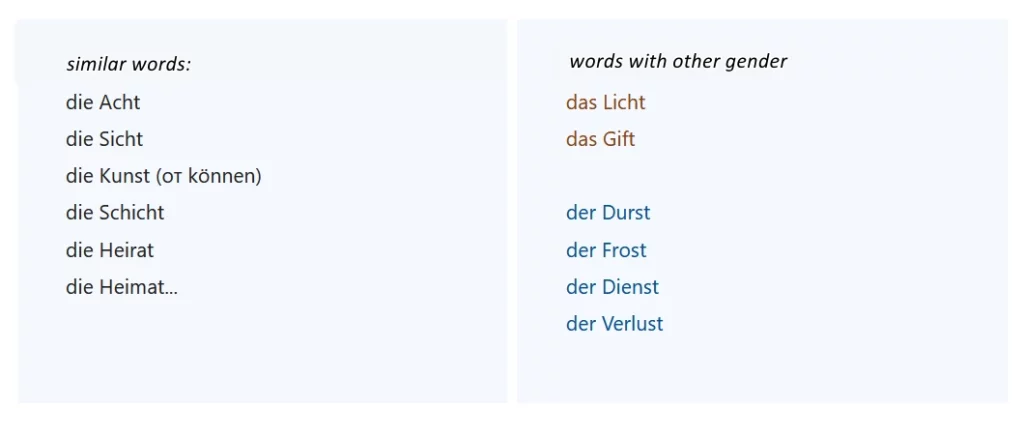
Words in -nis
Most words ending in -nis are neuter. The list of feminine nouns is short (at least as far as common words are concerned).
die Besorgnis
die Finsternis
die Erlaubnis
die Ersparnis
die Kenntnis
die Wildnis
Loanwords
Loanwords ending in -ie
We will consider this group separately, as there are variations here.
Words that come from Latin or French, have a collective or general meaning, or are derived from adjectives are classified as feminine. These are usually scientific terms, medical terms, names of sciences.
die Analogie
die Anomalie
die Geologie
die Harmonie
die Hierarchie
die Ironie
die Chemie
die Drogerie…
Now let’s look at words that deviate from the pattern. In fact, they have their own pattern, a different meaning and are similar only in form.
First of all, this is a word from the n-declension (n-Deklination:
der Laie
Es wird unterschiedlich ausgesprochen, mit betonten -e am Ende
Second, a couple of guys from England:
der Zombie
der Yuppie
And finally a few words:
das Knie (not loanword)
das Genie (initially it had a different form)
der Sellerie (from French, but different form)
Loanword ending in:
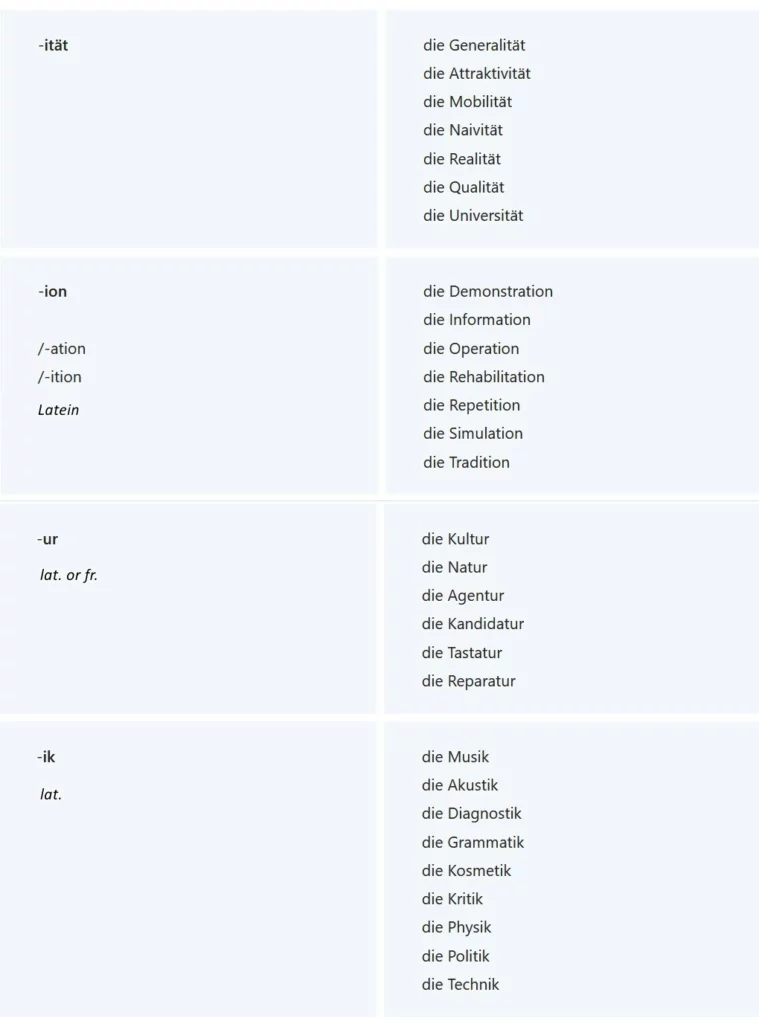

Exceptions: das Abitur, because it is a shortening of Abiturium, and das Futur for a similar reason.
Plural in the feminine gender in German
The most important suffix for feminine nouns in plural is -(e)n. It can also take the form -nen (for nouns ending in -in). Other endings only affect a very limited number of words.
If you do not see the image, please enable advertising and cookies.
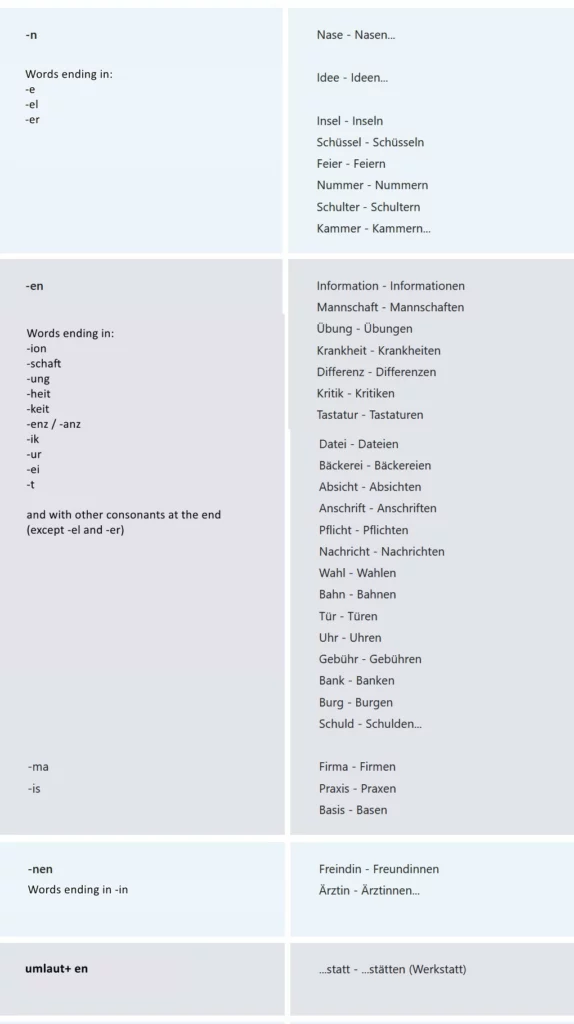
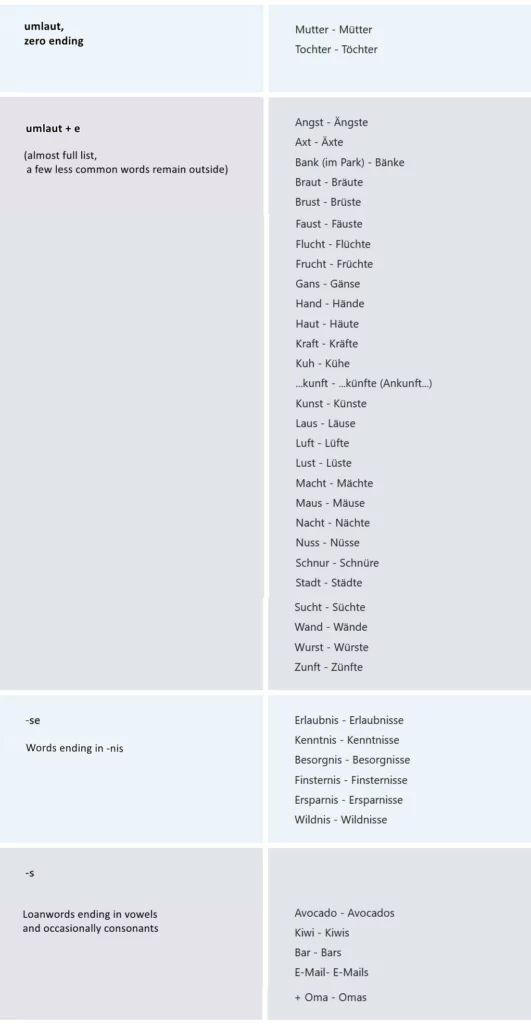
Declension of feminine gender
Feminines are practically not declined. However, a small group of words – those that have either no ending or the ending -e in the plural – receive the ending -n in the dative plural.
Dat Plural
Müttern
Gänsen
Erlaubnissen
Plural, declension, and gender in German. Masculine gender
Plural, declension, and gender in German. Neuter gender
Tests for Gender and Plural in German
Sentences with zu in German
Verbs with prepositions in German. Preposition um and preposition über
Modal verbs in German
Past tense in German. Perfect and preterite
Separable verbs in German
SS or ß in German
From horror to anxiety: fürchten, Angst haben, erschrecken, bangen, entsetzen
Reach an agreement: vereinbaren vs verabreden, ausmachen etc.
Fahrstuhl or Aufzug or Lift and others
Do you enjoy the site without cookies and maybe without ads? This means that I work for you at my own expense.
Perhaps you would like to support my work here.
Or Cookie settings change: round sign bottom left

